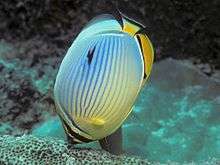Melon butterflyfish
The melon butterflyfish or Indian redfin butterflyfish (Chaetodon trifasciatus) is a species of butterflyfish (family Chaetodontidae). It is found in the Indian Ocean from East Africa to Western Java. This is one species of a closely related group which includes the Black-tailed Butterflyfish (C. austriacus) of the Red Sea and Gulf of Aden and the Oval Butterflyfish (C. lunulatus) which is found in the western Pacific, from eastern coasts of the Indonesian islands to Australia.[2][3]
| Melon butterflyfish | |
|---|---|
 | |
| Scientific classification | |
| Kingdom: | |
| Phylum: | |
| Class: | |
| Order: | |
| Family: | |
| Genus: | Chaetodon (but see text) |
| Subgenus: | Corallochaetodon |
| Species: | C. trifasciatus |
| Binomial name | |
| Chaetodon trifasciatus M. Park, 1797 | |
Melon butterflyfish should not to be confused with Chevron butterflyfish Chaetodon trifascialis, Three-striped butterflyfish Chaetodon tricinctus, or Three-banded butterflyfish Chaetodon robustus.
Description and characteristics
The oval butterflyfish and the black-tailed butterflyfish resemble C. trifasciatus in coloration. The former has a less conspicuous back patch below the dorsal fin and a mainly dark anal fin, while the latter has black caudal and anal fins.[2][3]
Melon, black-tailed and oval butterflyfishes and probably also the somewhat aberrant Arabian butterflyfish (C. melapterus) make up the subgenus Corallochaetodon, of which C. trifasciatus is the type species. They are probably quite close to the subgenus called "Citharoedus" (that name is a junior homonym of a mollusc genus), which contains for example the Scrawled butterflyfish (C. meyeri). Like that group, they might be separated in Megaprotodon if the genus Chaetodon is split up.[4][5]
Habitat and range
The melon butterflyfish is found in the Indian Ocean from East Africa to Western Java, at depths between 2 and 20 m, in coral-rich lagoons and semi-protected seaward reefs. Small juveniles are secretive and hide in corals.
Ecology and behaviour
Growing to a maximum of 15 cm long, the monogamous adults swim in pairs and may be territorial and aggressive to other Chaetodon. Melon butterflyfish feed exclusively on coral polyps, particularly of Pocillopora. They are oviparous.[3]
References
- Pyle, R., Rocha, L.A., Craig, M.T. & Pratchett, M. 2010. Chaetodon trifasciatus. In: IUCN 2013. IUCN Red List of Threatened Species. Version 2013.1. www.iucnredlist.org. Downloaded on 10 September 2013.
- Lieske, E. & Myers, R.F. (2004): Coral reef guide – Red Sea. HarperCollins, London. ISBN 0-00-715986-2
- FishBase [2008]: Chaetodon trifasciatus. Retrieved 2008-SEP-01.
- Fessler, Jennifer L. & Westneat, Mark W. (2007): Molecular phylogenetics of the butterflyfishes (Chaetodontidae): Taxonomy and biogeography of a global coral reef fish family. Mol. Phylogenet. Evol. 45(1): 50–68. doi:10.1016/j.ympev.2007.05.018 (HTML abstract)
- Hsu, Kui-Ching; Chen, Jeng-Ping & Shao, Kwang-Tsao (2007): Molecular phylogeny of Chaetodon (Teleostei: Chaetodontidae) in the Indo-West Pacific: evolution in geminate species pairs and species groups. Raffles Bulletin of Zoology Supplement 14: 77-86. PDF fulltext Archived 2007-08-11 at the Wayback Machine
External links
- Photos of Melon butterflyfish on Sealife Collection
| Wikimedia Commons has media related to Chaetodon trifasciatus. |
| Wikispecies has information related to Chaetodon trifasciatus |
